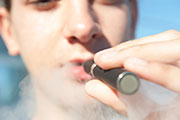
MONDAY, Sept. 7, 2015 (HealthDay News) — There’s new reason for parents to be concerned about e-cigarettes: nearly one in five kids who uses e-cigarettes may be using the devices to get high, a study finds.
And, parents may not always know it’s happening.
“Police and parents report difficulty in detecting vaporized cannabis use because it is easily concealed by the absence of the pungent and characteristic odor of smoked cannabis,” the study authors wrote.
A confidential survey revealed that 18 percent of e-cigarette users in Connecticut high schools have “vaped” marijuana at some point, or used an e-cigarette to get high. In addition, more than one-quarter of kids who describe themselves as dual users of both e-cigarettes and marijuana have used the devices get high, the researchers found.
The kids use the e-cigarette devices to burn hash oil or waxy hash “dabs,” or simply burn dried pot leaves using the heat generated by the battery-powered devices, according to the study published online Sept. 7 in the journal Pediatrics.
Senior author Suchitra Krishnan-Sarin, an associate professor of psychiatry at Yale University School of Medicine, said she and her colleagues conducted the survey based on their earlier research into e-cigarettes, during which some students had mentioned that the devices can be used to get high.
Researchers still aren’t certain exactly how kids are converting the e-cigarettes for marijuana use, Krishnan-Sarin said. They also can’t say whether these results reflect kids who’ve only tried this once, or kids who’ve made a habit of getting high using their e-cigarettes.
“There’s so much more about this that’s unknown than is known,” she said.
E-cigarette use among high schoolers tripled between 2013 and 2014, leaping from 4.5 percent to more than 13 percent, the researchers said in background information in the study.
In 2013, Krishnan-Sarin and her research team began to hear rumors of widespread use of e-cigarettes to get high. To check this out, the investigators anonymously surveyed almost 4,000 students at five high schools in Connecticut in spring 2014.
The results indicated that boys and younger students were more likely to use e-cigarettes with marijuana than were girls or older students.
About 4.5 percent of all students reported using e-cigarettes to vaporize hash oil, the study found. Three percent said they’d used the devices to vaporize THC-infused wax (dabs), and 7 percent had stuffed dried pot leaves into the portable vaporizers, the study said.
“This is the first I’ve heard of it, but I can’t say I’m shocked,” said Sean Clarkin, director of strategy and program management at the Partnership for Drug-Free Kids. “That said, these numbers are alarming.”
Krishnan-Sarin said the results add further evidence that e-cigarettes need strict regulation. At this time, there is no regulation of e-cigarettes, although the U.S. Food and Drug Administration has issued proposed rules that would grant it that authority.
“One of the reasons kids can use cannabis and other substances in e-cigarettes is because they can manipulate them,” she said. “Is there a way to make these devices so they can’t be manipulated by kids in this fashion?”
Gregory Conley, president of the American Vaping Association, said increased regulation will not solve the problem.
“It is puzzling that the [study] authors believe regulation of vapor products will somehow address the use of marijuana products that are already illegal for minors to possess in all 50 states,” Conley said. “The FDA is only empowered to regulate nicotine-containing vapor products, so marijuana vaping products will only truly be regulated if a massive change in U.S. drug laws take place,” he added.
“The e-cigarette cartridges and tanks that are capable of vaporizing THC oil or wax are generally specifically made for marijuana,” Conley explained. “These are not the same products being sold in vape shops and convenience stores.”
Clarkin said he’s particularly concerned that kids will receive a more potent dose of THC when they vape marijuana. THC is the ingredient in marijuana that produces intoxication.
“There are plenty of kids who are doing fine in school and for whom this is not going to be a problem, but there are a lot of kids who are teetering on the academic edge,” Clarkin said. “This could be the difference between them graduating and making something of themselves, versus falling off the rails.”
But while he agrees there needs to be increased regulation that keeps e-cigarettes out of the hands of teens, Clarkin said that regulation alone won’t stop this.
“Controlling supply is never the only answer. There’s got to be much more education,” he said. “There’s got to be real understanding and engagement on the part of parents. Parents need to understand why their kids might want to do this, and do all they can to support their kids’ positive behavior.”
More information
For more on e-cigarettes, visit the U.S. National Institutes of Health.
Copyright © 2026 HealthDay. All rights reserved.

